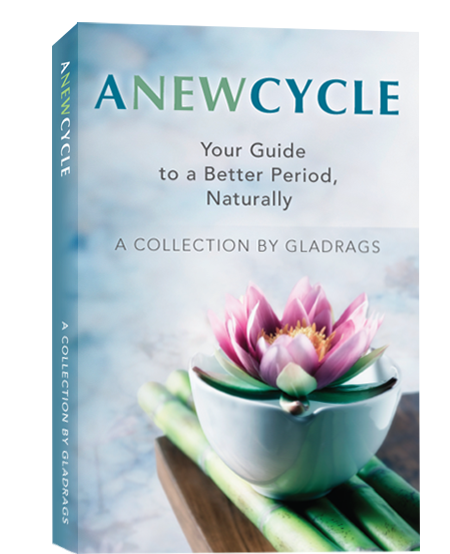
How to Keep Your Vagina Healthy, or How to Properly Tend Your Vagina Garden
This blog is an excerpt from the book A New Cycle – Your Guide to a Better Period, Naturally.
The vagina: your lady flower, your hooha, your va-jay-jay. Call it what you will, it is a lovely and complex part of your body. Every vagina is different, and women frequently worry that theirs is somehow “not normal.” This blog is designed to explain the wide variety of normal vaginas and how to properly care for yours. But first, a quick anatomy lesson.
What we commonly think of as the vagina is really an interconnected set of body parts. There’s the vulva, which is the external part including the mons (the fatty pad of tissue over the pubic bone), the outer lips (the labia majora), and the inner lips (the labia minora). At the point where the inner lips join at the top is the clitoris, that most lovely and sensitive spot. Fun fact: the part of the clitoris you can feel and see from the outside is actually just the tip of a larger organ that extends deep inside your body! Then there’s the vagina itself, which is the flexible corridor that leads to your cervix, the opening of your uterus. The vagina can expand and stretch to accommodate a penis, a baby, fingers, sex toys, spare change, etc. It is not the rigid tube most anatomy textbooks make it out to be.
The inside of your vagina is a moist, warm, acidic environment that is the happy home to a whole host of bacteria, or flora. I think of the vagina as a rainforest. Like a rainforest, there are many different organisms growing, and there is a delicate balance of moisture, acidity, and heat that keeps the ecosystem thriving. Most of the time, your body regulates that balance to keep your vagina healthy. It produces discharge that helps to flush out harmful bacteria or debris. It maintains an acidic environment in your vagina that is preferred by a diverse collection of healthy bacteria. Those healthy bacteria, in turn, crowd out any unhealthy bacteria and fungi that may have gotten in. Like supporting a rainforest, taking care of your vagina means both supporting a healthy ecosystem and not introducing any non-native outsiders.
Since your vagina is a part of you, keeping your vagina healthy is in large part keeping YOU healthy. I often tell my clients that there are six basic things they can do to stay healthy:
- Eat a healthy diet: lots of fruits and vegetables, not a lot of sugar and simple carbs.
- Drink plenty of fluids: preferably water instead of sugary drinks or juices.
- Get enough exercise: good for your mood, your bones, your heart. The list goes on!
- Reduce stress in your life: set limits, go for a hike, take time to breathe.
- Get sufficient sleep: essential for giving your body and mind a chance to recharge.
- Quit smoking: easier said than done, but worth the effort.
These simple choices will give your overall health a boost and will help your vagina stay in balance. In addition, there are some specific things you can do to keep your vagina happy and healthy:
- Only use water and your hands to clean your vagina. In general, your vagina cleans itself through normal secretions. Your vagina doesn’t need soap to get clean, and it certainly doesn’t need to be roughed up with a loofah. In fact, soaps can irritate your vagina and throw your healthy bacteria out of balance. If you absolutely can’t stand the idea of not using soap, use an unscented, mild bar soap, just on the outside of your vagina.
- Wipe front to back. The bacteria from your butt don’t belong in your vagina. Wiping front to back keeps them from moving that direction.
- Avoid putting anything scented or dyed on, in, or near your vagina. This includes douches, sprays, scented panty liners or tampons, and strong soaps or detergents. These products can irritate your vagina and disrupt the normal delicate balance, allowing fungi and unhealthy bacteria to overgrow.
- Wear cotton undies and skip the panty hose. Synthetic fibers don’t breathe well, and keep heat and sweat trapped inside. A sweaty, warm environment is a breeding ground for unhealthy bacteria to overgrow and cause odors and infections.
- Practice safe sex. Sexually transmitted infections can make your vagina and other assorted lady parts very unhappy. By using condoms correctly, getting your partners screened for STIs before initiating sex, and getting tested yourself, you can reduce your risk of picking up one of these infections and avoid the long-term harms these infections can cause.
- Do your Kegels! Pelvic floor strengthening exercises (also known as Kegels) can help increase blood flow to your vagina, prevent and treat urinary incontinence, and improve your sex life (Dumoulin, 2010). You can identify these muscles by using your vaginal muscles to squeeze a vaginal weight, fingers, or penis. Once you’ve got the hang of it, you can do Kegels anytime without anyone else knowing!
Give your vagina the love it needs. Pleasure yourself or have someone else pleasure you. Studies have shown that sex (generally) and orgasms (specifically) have numerous health benefits. Arousal and orgasm increase blood flow to your vagina, improving its elasticity, lubrication, sensation, and ability to fight off infections.